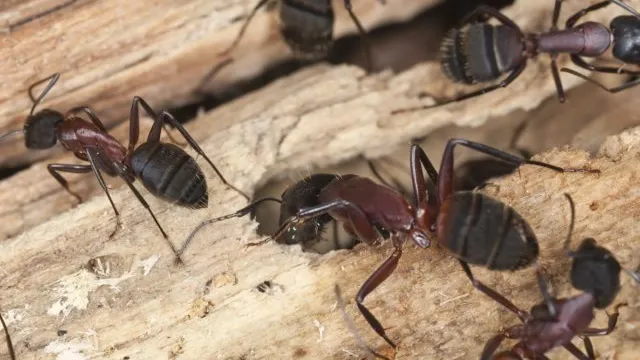
Carpenter ants can be a homeowner's worst nightmare. These tiny but destructive creatures can wreak havoc on your property if not dealt with promptly and effectively. In this ultimate guide, we will provide you with all the information you need to handle carpenter ant infestations and restore peace to your home.
Carpenter ants are not like your typical household ants. They are larger in size and have the ability to cause structural damages to your property. Understanding their behavior and identifying signs of infestation are crucial steps in effectively dealing with carpenter ants.
When it comes to carpenter ant infestations, prevention is key. Start by addressing any moisture issues in and around your home, as these ants are attracted to damp or decaying wood. Ensuring proper ventilation in crawl spaces and attics can help reduce the risk of infestation. Additionally, sealing cracks and crevices in your home's foundation and keeping tree branches trimmed away from the house can make it harder for carpenter ants to gain entry.
Before we dive into effective control methods, it's important to understand the behavior of carpenter ants. Unlike termites that feed on wood, carpenter ants tunnel through it to create their nests. They typically seek out damp or decaying wood, making water-damaged areas of your home prime targets.
Carpenter ants establish satellite colonies around the main nest, making it challenging to eradicate an infestation completely. These ants are active both day and night, so spotting them during a late-night pantry raid might be a sign of trouble.
It's also worth noting that carpenter ants do not eat wood but rather forage for food, such as other insects and sweet substances. Understanding their dietary preferences can help in implementing targeted baiting strategies to control their population.

Recognizing the signs of a carpenter ant infestation is crucial to taking action early. Look out for piles of sawdust-like material, known as "frass," near wood surfaces. This frass is the debris created by the ants as they excavate tunnels.
Other signs include the presence of winged ants or discarded wings, which indicate the presence of swarmers looking to establish new colonies. You may also spot worker ants traveling in trails between their food source and nest.
Regular inspections of your property, both indoors and outdoors, can help detect early signs of carpenter ant activity. By staying vigilant and addressing any issues promptly, you can effectively manage and prevent infestations before they cause significant damage.
Now that you are familiar with carpenter ants' behavior and signs of infestation, it's time to explore the various solutions available for effective control.
Carpenter ants are a common nuisance in many households, known for their destructive behavior as they tunnel through wood to build their nests. To effectively control these pests, it's essential to consider a range of solutions that cater to different levels of infestation.
Understanding the options available for carpenter ant control can help you make an informed decision based on the severity of the infestation and your preferences.

If you prefer a more eco-friendly approach, several natural remedies can help you get rid of carpenter ants. These include using essential oils such as peppermint, cinnamon, or citrus to repel ants. Additionally, diatomaceous earth can be applied to ant trails to dehydrate and kill them.
Keep in mind that natural remedies may take longer to show results and may not completely eliminate the infestation if it's severe. They are best suited for smaller ant problems or as preventive measures.
While natural remedies can be effective for minor infestations, it's important to monitor their progress and be prepared to explore other options if the problem persists or worsens.
If your carpenter ant infestation is severe or persistent, it may be time to call in the professionals. Pest control companies have access to specialized products and expertise to effectively eliminate carpenter ants from your property.
Professional pest control options may include the use of targeted insecticides, such as non-repellent sprays or baits, which can be more potent and have longer-lasting effects compared to over-the-counter products. Trained professionals will also conduct a thorough inspection to identify and treat all potential nesting sites.
When considering professional pest control options, it's essential to choose a reputable company with a track record of successfully handling carpenter ant infestations. By opting for professional help, you can ensure a comprehensive and tailored approach to carpenter ant control, addressing the root of the problem effectively.
If you prefer a hands-on approach, there are several DIY methods to combat carpenter ants. These include treating visible ant trails with a mixture of borax and sugar to attract and poison them. Locating and sealing off potential entry points, such as cracks in the foundation or gaps around windows, can also help prevent future infestations.
However, it's important to note that DIY methods may yield mixed results and require consistent monitoring and follow-up treatments. They are best suited for smaller infestations and as supplementary measures to professional pest control.
The battle against carpenter ants doesn't end when you eliminate an existing infestation. Preventing future infestations is equally important to protect your home in the long run.
Start by minimizing moisture problems, such as fixing leaky pipes and properly ventilating damp areas. Trim tree branches and vegetation that provide easy access for ants to your home. Regularly inspect and maintain the integrity of wooden structures, especially those in contact with the soil.
Consider applying a barrier treatment around your property's perimeter. This can deter ants from entering and nesting, acting as an extra line of defense.
Additionally, you can create a DIY ant repellent using essential oils. Carpenter ants are repelled by certain scents, such as peppermint, cinnamon, and citrus. By mixing a few drops of these essential oils with water and spraying it around potential entry points, you can create a natural barrier that discourages ants from entering your home.
In conclusion, handling carpenter ant infestations requires a combination of understanding their behavior, recognizing signs of infestation, and implementing effective control methods. Whether you choose natural remedies, professional pest control, or a mix of DIY approaches, it's important to act promptly and consistently to protect your home from these destructive pests.
By following the tips and strategies outlined in this ultimate guide, you can regain control over your property and bid farewell to carpenter ants for good.